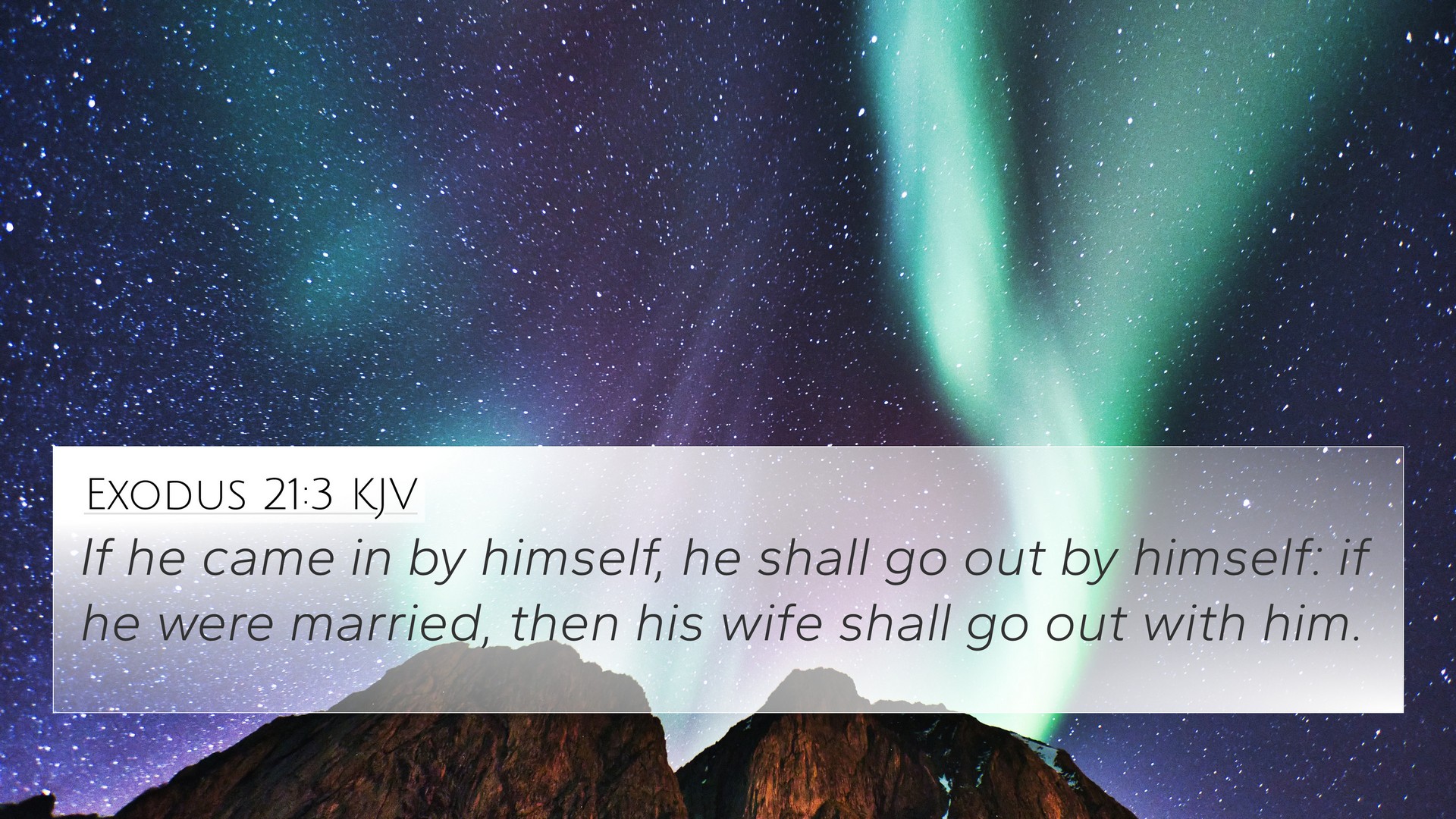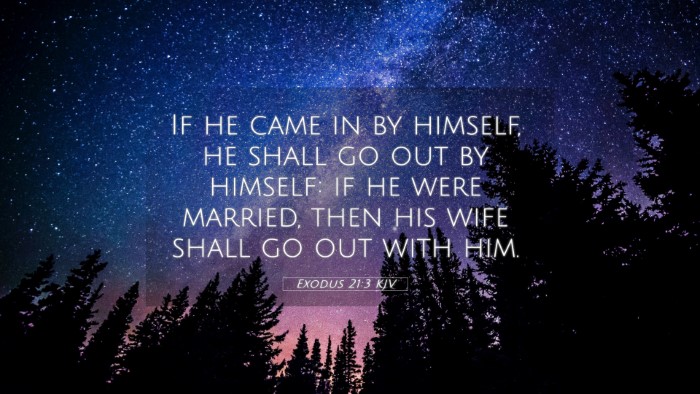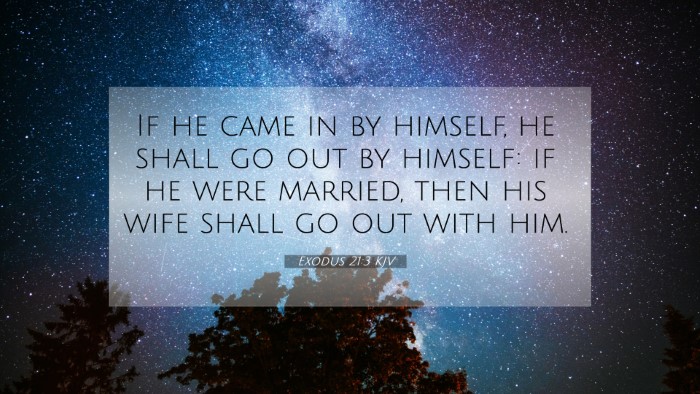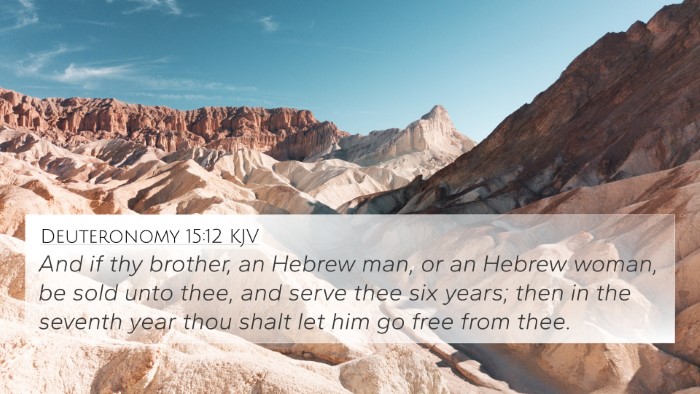Understanding Exodus 21:3: A Comprehensive Analysis
Exodus 21:3 states:
"If he comes in by himself, he shall go out by himself; but if he is the husband of a wife, then his wife shall go out with him."
This verse is part of the instruction regarding Hebrew servants and reflects the broader themes of justice, freedom, and familial relationships within the laws given to the Israelites. Below, we analyze its meaning through various public domain commentaries.
Context and Background
This verse occurs within a legal framework established in the book of Exodus, aimed at regulating the lives of the Hebrew people after their exodus from Egypt. It depicts the stipulations governing servitude, particularly highlighting the rights of individuals and their families.
Verse Analysis
-
Matthew Henry's Commentary:
Matthew Henry emphasizes the principle of individual rights and the significance of family ties. He points to the idea that if a man comes into servitude alone, he will leave the same way, thus preserving his autonomy. However, if he has a spouse, the family unit is recognized, allowing them to leave together as a unit, which reflects the value of marriage and family in God's law.
-
Albert Barnes' Notes:
Albert Barnes provides insight into the social structure of ancient Israel and how it reflects God's concern for servants. He notes that the legal stipulation assures that the family does not suffer under servitude's burdens. The law reflects not only justice but also mercy, allowing for a compassionate exit for those bound by circumstance.
-
Adam Clarke's Commentary:
Adam Clarke explores the implications of this law, indicating that it demonstrates God's intention to protect families even in servitude. He also discusses the importance of communal responsibility and care, suggesting that this law serves as a model for servant-master relationships throughout Scripture.
Thematic Connections
Exodus 21:3 establishes key themes regarding servitude, freedom, and family that resonate throughout the Bible. Below are crucial thematic connections with other scriptures:
-
Leviticus 25:39-40:
This passage parallels the concept of servitude, emphasizing that Hebrew servants should not be treated like slaves but should be treated kindly. It highlights fairness in labor relations and reinforces the importance of family unity.
-
Deuteronomy 15:12-15:
Here, the law further elaborates on the release of Hebrew servants, reflecting a cycle of mercy and justice that aligns with Exodus 21:3's focus on family rights.
-
Matthew 11:28-30:
In the New Testament, Jesus invites those burdened to come to Him for rest. This call resonates with the liberation motif found in Exodus, affirming the ultimate call to freedom that transcends earthly servitude.
-
Galatians 4:4-7:
Paul’s discussion of sonship highlights the transformation from servitude to belonging in Christ, aligning with the familial focus of Exodus 21:3 as it pertains to God's people.
-
John 8:36:
This scripture emphasizes that whom the Son sets free is truly free, echoing the freedom discussed in the context of Exodus 21:3 and highlighting Christ's role in liberating individuals from bondage.
-
Ephesians 6:5-9:
This passage talks about the relationship between slaves and masters, providing guidance that reflects the principles of justice and mercy outlined in Exodus 21:3.
-
1 Peter 2:16:
Peters urges believers to live as free people while serving God, reinforcing the freedom theme that is tied to servitude and family relationships in Exodus.
Connections Between Bible Verses
The connections made in Exodus 21:3 through cross-referencing biblical texts illustrate the overarching themes of justice, familial bonds, and freedom. Understanding these links enhances our comprehension of the Scriptures as a whole.
Exploring Cross-References
For those studying the Bible, utilizing tools for cross-referencing can enrich one's understanding. Some effective methods include:
- Bible Concordance: A biblical concordance provides a systematic method to locate themes and keywords across various texts.
- Bible Cross-Reference Guides: Guides that highlight connections between verses can facilitate deeper insights.
- Cross-Reference Bible Study: Engaging in studies that require comparing verses fosters comprehension and thematic awareness.
- Bible Reference Resources: Various online and offline resources that provide cross-referencing aids can be utilized for research.
Conclusion
Exodus 21:3 showcases a delicate balance between individual rights and family protection within the Mosaic Law. By understanding this verse and its interconnections with other scriptures, one gains a clearer perspective on God's design for justice and family within the community of faith. Through comprehensive Bible verse analysis and thematic exploration, readers can derive profound lessons from this ancient text applicable to modern life.
Additional Insights on Cross-Referencing in Study
For those interested in more deeply understanding how to use Bible cross-references, the following tips may prove useful:
- Study related themes across both the Old and New Testaments to identify parallels.
- Investigate detailed cross-references between the Gospels to appreciate their divergences and commonalities.
- Delve into cross-referenced themes in the Bible to uncover how various authors convey similar spiritual truths.
- Consider the context of each verse when making comparisons as cultural and historical settings can affect interpretation.
Closing Thoughts
By exploring Bible verses with a focus on connections, scholars and laypeople alike can deepen their faith and understanding of the divine narrative woven throughout Scripture. Exodus 21:3, while a foundational legal directive, opens the door to richer discussions on family, freedom, and God's vision for His people across time.



